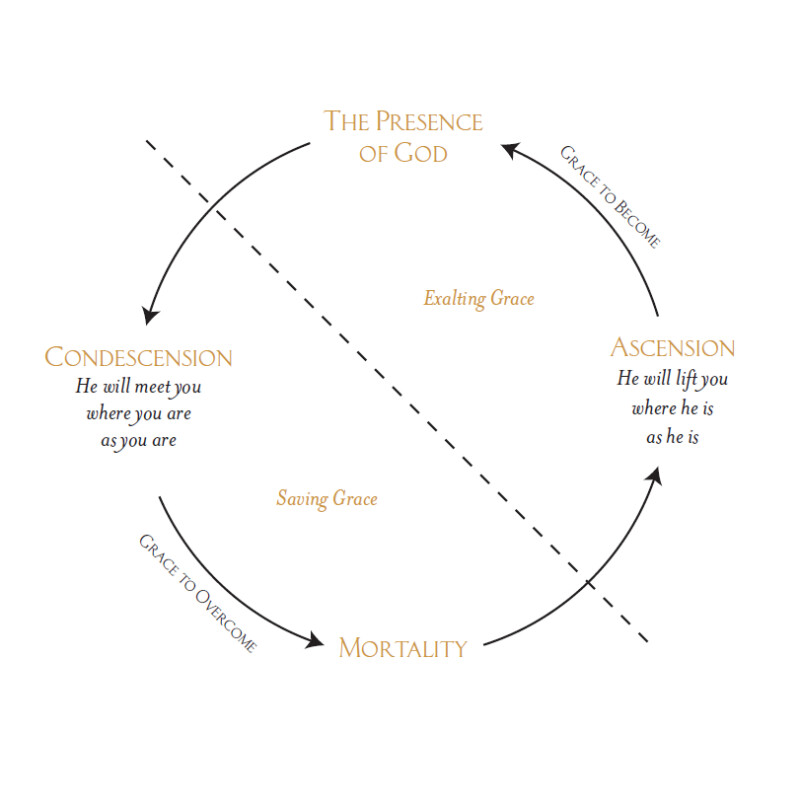You could have filled a vial with my tears that night. Perhaps someone in heaven did. Life wasn’t going the way I thought it would. It was broken; I was broken. Exhausted. Maybe the sun still came up every morning, but I had stopped noticing. All was not well. For the first time in a year that had completely fallen apart, I poured out my heart to God. I told Him what hurt, what I couldn’t carry alone anymore. My soul just needed rest. Then grace came, saving grace. In the midst of that dark moment, sweet peace filled the room. The Spirit of the Lord. On that sacred night, the burden lifted for a time, and a portion of healing washed over my heavy heart. . . .
Maybe you know what it is to raise a child with a diagnosis that will last throughout mortality. In the beginning, the dread of facing that challenge again day after day had the potential to destroy me. I didn’t want to get out of bed in the morning, I cried several times each day, and every night I would fall into bed with a prayer of exhaustion, pleading for His grace. Healing. Deliverance. Rescue. Every night, without fail, He would send the grace of His Son to heal me and strengthen me. To give me rest. Grace to overcome the pain. But that saving grace in and of itself was not all that was needed for my journey. It was a balm that quieted me, but I needed something more.
In those first days and months after the diagnosis my heart needed healing, but as the days went on, I realized what I would need most was to be transformed into the mother that Josh needed me to be. A mother who would sacrifice sleep in order to ensure health, who would work outside the home in order to pay medical bills, who would learn basic nursing skills in order to preserve life.
I didn’t want to do any of those things; my own capacity did not qualify me for it. But my mortality required it.
Knowing my story, God sent One willing to count the tears in the midnight hours, but also One willing to enable me and transform me to become equal to the task. To increase my capacity. To lift me. To transform me through grace into the mother whose job was to poke and prick and restrict and control while also being the mother who could comfort and encourage and bring joy.
On my own, becoming that mother was impossible.
I wasn’t strong enough.
But with Him, through His transforming grace, I could.
***
The wind rustled soft through the leaves of the giant tree. We settled into the shade, grateful for a pause in the day. She with her black hair hanging long over her shoulders, me with a straw hat and bare feet. It was a slow afternoon. The kind where you can lean into deep conversation; the type of talking that heals a soul. She asked about Jesus, and belief, and grace. Why live a covenant life when most of the world tells you belief in Christ is sufficient?
It is a good question. One that many people are asking now. The answer to that question is one I have been seeking for years. The learning has come in seasons, precept by precept. Sometimes knowledge distills upon a soul like drops of dew. It takes time in His word, personal encounters with Christ, walking His covenant path. The greatest learning often comes through the tutoring of the Spirit as it comes and goes, whispering of heavenly things (see John 3:8–13).
“Life has led me to experience two types of grace,” I told her.
“One is the grace that heals wounds. This is the grace that glitters down from heaven to meet you where you are, as you are. It is the balm of broken things, the righting of what’s gone wrong, the mending of a heart. I have felt it in the midnight hours, in the struggle, in the sorrow of heavy things. This grace flows from the merits of the Atonement of Christ to help us overcome.”
“I have also experienced a grace that elevates souls,” I explained to her. “This is a grace that lifts, increases capacity, transforms us, and enables increase and progression. This grace flows from the merits of the Atonement of Christ to help us become.”
“You and I need both,” I told her. “One is felt in the moments we allow Him to enter our story. The other is felt in the moments we allow Him to finish our story. In my life, I view one as salvific and the other as exalting. Saving grace is received through belief in Christ and His atoning sacrifice. Exalting grace is also received through belief in Christ and His atoning sacrifice, but is administered by the Holy Ghost as we participate in sacred ordinances and covenants.”1
Saving grace is the enabling strength to overcome.
Exalting grace is the enabling strength to become.2

There are days when I am in need of saving. Healing. Fallen moments when I want nothing more than to receive His gift of grace for the healing of bitter wounds. But there are other days when I long to be transformed into a better mother, a better friend, a better wife. On those days, I yearn for an increase of capacity—although I still seek healing, deliverance, and rescue, what I need most is transformation, progression, and becoming. There is something significant in believing Jesus Christ can lift me to better living, a condition I could never arrive at on my own, and allowing His enabling strength to make it possible.
As we spoke, I watched the tears fill her eyes. “Why have I never understood this before?” she whispered. “The importance of the ordinances and covenants. They are more than what I thought. They are what enables the becoming. The exalting. Where can I learn more about this process of lifting?” she wondered.
Perhaps you wonder the same thing.
It is a beautiful truth sprinkled throughout all of scripture. You will discover it in every book of the standard works. Jesus came down to lift us up. “And my Father sent me that I might be lifted up upon the cross; and after that I had been lifted up upon the cross, that I might draw all men unto me, that as I have been lifted up by men even so should men be lifted up by the Father. . . . And for this cause have I been lifted up; therefore, according to the power of the Father I will draw all men unto me, that they may be judged according to their works. . . . [And] nothing entereth into his rest save it be those who have washed their garments in my blood, because of their faith, and the repentance of all their sins, and their faithfulness unto the end” (3 Nephi 27:14–15, 19).
No matter where you read the story of Christ, you will discover a coming down and a lifting up. Christ did not come simply to meet us where we are, as we are; He came to lift us up to where He is, as He is. He offers saving grace to heal us, but as we walk the covenant path, He also means to transform us and lift us through His gift of exalting grace.
“And I, if I be lifted up from the earth, will draw all men unto me” (John 12:32).
Upward and forward.
Increase and progression.
The fulness of this transformation will require us to grasp hold of the promise given to Abraham, to enter into the covenant path that exalts. The Father knew we would need greater guidance, greater protection, and greater inspiration for the full transformation to take place. He knew how those privileges would be magnified through priesthood ordinances and covenants. It is why He designed the path; He knew walking it would lead to the lifting and progression and increase.
▶ You may also like: Does religion sometimes feel heavy? Read Emily Belle Freeman’s thoughts for the most exhausting days
As our conversation drew to a close, she asked me one more question, my friend with the dark hair and the tears glistening in her brown eyes. “Teach me what you believe about the temple because of your understanding of this grace.”
Her question made me stop and consider something I hadn’t before. “It’s all about relationship,” I realized as I spoke the words out loud. “I enter into those ordinances and covenants not out of obligation or expectation, but because of deep longing for what I hope to receive and become through Him. In the end, my goal is not to just become the best mother or friend or sister or spouse I can be in this life, but to actually become like Him. Like He is. I long for His grace to help me through mortality, to transform me into the best version of myself I can be while I am here. When all is said and done, my highest goal is to become like Him so I can return back to the Father’s presence. I need more than just the grace that will strengthen me through mortality. I want to go home.”
As we move along the covenant path from salvation to exaltation, Christ enables our progress through grace. His saving grace rescues us, heals us, delivers us, and helps us overcome death, sin, and the weakness of mortality. His exalting grace enables progression, increase, and transformation—the ability to become as He is and eventually receive the Father’s fulness.
Saving grace meets us where we are, as we are—it is grace to overcome. But Christ doesn’t intend to leave us there. He plans to lift us up, to return us back to the presence of God—to where He is, as He is. For that, He offers exalting grace—grace to become.
Just like saving grace, this grace that elevates souls is also a gift. If you reach out to fully embrace it, if that becomes paramount, your life will never be the same.
Stretch wide your arms, dear friend.
Look up.
His gift is showering down upon you.
Grace to Become
Notes
1. See D. Todd Christofferson, “Why the Covenant Path,” Liahona, May 2021, 116.
2. See Tad R. Callister, The Infinite Atonement (2000), 263–68, 276–77.



